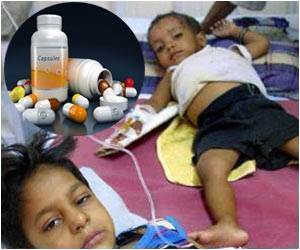Nearly 300 people have died of cholera in Zimbabwe, the United Nations said Friday, as health authorities battled to contain unprecedented countrywide outbreaks.
Nearly 300 people have died of cholera in Zimbabwe, the United Nations said Friday, as health authorities battled to contain unprecedented countrywide outbreaks.
"The cholera outbreak has taken a national dimension. Newer outbreaks are reported from all provinces." the UN's Geneva-based Office for the Coordination of Humanitarian Affairs said in a statement."The total number of suspected cholera cases in the country stands at 6,072 cases and 294 deaths," as of November 18, it said.
By Friday, Zimbabwe's health authorities said the water-borne disease had spread to nine of the troubled southern African nation's 10 provinces.
"The ministry is battling to control unprecedented cholera outbreaks affecting the country," Health Minister David Parirenyatwa told the Herald newspaper, a government mouthpiece.
The UN said the latest outbreaks were reported from Beitbridge in the Matabele South province with 700 cases and 20 deaths. Health facilities in the area are reporting an admission rate of 200 patients per day, OCHA said.
"The spatial distribution of outbreaks will most likely continue to expand as well as the number of people infected," given the worsening water and sanitation situation in densely-populated areas, it warned.
Advertisement
"We have a very bad, dire political situation that's ... leading to a food and health emergency, man-made, in this country," McGee told reporters in Washington via a satellite television link.
Advertisement
"Our health delivery system, previously the envy of many developing countries is now tinkering on the verge of virtual collapse," said the Zimbabwe Association of Doctors for Human Rights.
"Sick people in need of medical attention are being turned away from Zimbabwe's hospitals and clinics."
The country's main referral hospitals in Harare and Bulawayo were virtually closed and most district hospitals and municipal clinics were barely functioning or closed, it said in a statement calling for urgent action.
Both the association and the Zimbabwe Medical Association, which described the outbreak as "forseeable and thus avoidable" in the Herald newspaper, urged the government to declare the situation a national disaster.
The Herald reported Friday that a hospital in Mutoko, northeast of Harare where three people had died, was contemplating closing due to critical food shortages.
Parirenyatwa admitted "the situation in government hospitals is bad" but hoped food would soon be made available under the inflation battered Reserve Bank's programme to ensure Zimbabweans had basic commodities.
Zimbabwe's health system, once among the best in Africa, has collapsed under the weight of the world's highest inflation rate, last estimated at 231 million percent in July.
Mugabe and opposition leader Morgan Tsvangirai signed a power-sharing deal in September but have yet to form a unity government, forcing the country into a worsening economic and humanitarian crisis.
South Africa has said it will withhold economic aid to Zimbabwe, following several foreign donors who have refused bail-out packages until a unity government is in place.
Zimbabwe's economy has been in free-fall for years, leaving 80 percent of the population in poverty and nearly half the country in need of emergency food aid by January, according to the United Nations.
Source-AFP
LIN











